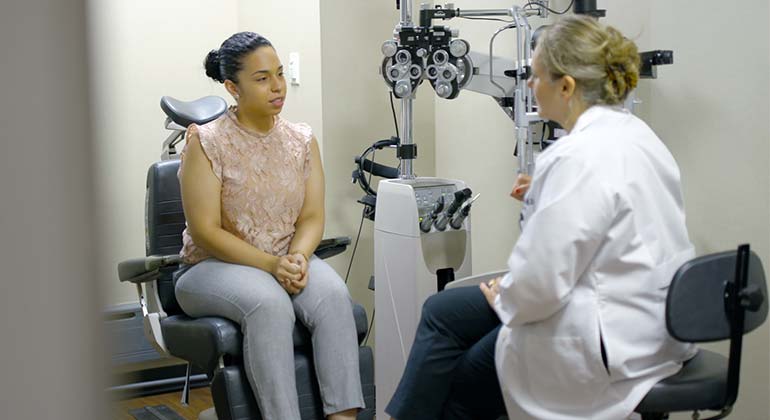Exploring the World of Refractive Surgeries: What You Need To Know for Improved Eyecare
In the realm of eye care, refractive surgeries have actually emerged as a prominent choice for people looking for to correct vision issues and decrease their dependence on glasses or get in touch with lenses. As developments in innovation proceed to improve these medical methods, remaining notified about the most current developments and best methods in refractive surgical procedures ends up being critical for those considering this transformative journey in the direction of better eye health and vision.
Types of Refractive Surgical Treatments
Refractive surgeries encompass a range of treatments aimed at remedying vision problems by reshaping the cornea or lens of the eye. One of the most usual types of refractive surgery is LASIK (Laser-Assisted in Situ Keratomileusis), which involves producing a thin flap in the cornea, improving the underlying cells with a laser, and rearranging the flap.
In addition to these laser-based procedures, there are also implantable lenses such as Phakic intraocular lenses (IOLs) that can be placed right into the eye to fix refractive errors. These lenses are specifically helpful for individuals with high prescriptions or those unsuitable for laser surgical treatment. It is crucial to seek advice from an eye care professional to identify one of the most suitable sort of refractive surgical procedure based on private demands and eye wellness.
Benefits of Refractive Procedures
Having discovered the numerous sorts of refractive surgical treatments available, it is crucial to understand the substantial benefits connected with these treatments for dealing with vision problems. One of the primary benefits of refractive treatments is the capacity for achieving clear vision without the requirement for rehabilitative lenses. This can boost everyday tasks such as driving, analysis, and taking part in sporting activities without the headache of glasses or get in touch with lenses. Furthermore, refractive surgical treatments like LASIK and PRK use quick healing times, with lots of people experiencing enhanced vision within a day or 2 after the treatment.
One more trick benefit is the long-term cost savings associated with refractive surgeries. Refractive surgical procedures can supply a permanent solution to vision issues, lowering the demand for routine brows through to updates and eye doctors to prescriptions.
Risks and Factors To Consider
Prior to undertaking any refractive surgical treatment, it is vital to thoroughly consider the potential threats and crucial variables linked with the procedure. While refractive surgical treatments like LASIK and PRK are normally secure and reliable, there are still risks entailed that need to be taken into account.
Additionally, specific factors need to be thought about prior to choosing a refractive surgery. These include the stability of your vision prescription, your overall eye wellness, and any existing eye conditions. Clients with specific medical problems such as autoimmune problems or unstable vision may not be good candidates for refractive surgery. Comprehending these factors to consider and dangers can help individuals make educated choices about their eye treatment and whether refractive surgical procedure is the right option for them.

Planning For Surgical Treatment
Comprehending the risks and considerations associated with refractive surgical procedures is essential as individuals start the process of getting ready for the procedure. Prior to undergoing any refractive surgery, it is necessary to set up an extensive eye exam with an eye doctor focused on refractive procedures. This evaluation will certainly establish the wellness of the eyes, examine the refractive error, and recognize any type of prospective contraindications for surgical treatment.
During the pre-operative examination, the surgeon will discuss the various medical options available, discuss the benefits and risks of each treatment, and respond to any kind of concerns the person may have. It is very important for people to reveal their case history, existing medications, and any type of eye conditions they may need to guarantee a successful and safe surgical treatment.
To prepare for the surgical treatment, people might be suggested to cease wearing call lenses for a particular duration before the procedure. In addition, they need to schedule transport to and from the surgical facility on the day of the treatment, as they might not have the ability to drive instantly after surgical procedure. Complying with these preparatory actions will certainly aid make certain a successful and smooth refractive surgical procedure experience.
Post-Surgery Care
After undertaking refractive surgical treatment, correct post-operative care is vital to promote healing and ensure optimum vision outcomes. Adhering to surgery, individuals must strictly stick to the standards provided by their eye doctor to reduce the threat of complications and achieve the finest outcomes.
Originally, people might experience some pain, dryness, or fuzzy vision, yet these signs and symptoms generally enhance within a couple of days to weeks. It is vital to attend all set up follow-up appointments to monitor progression and deal with any kind of concerns promptly.
During the healing duration, individuals need to stay clear of massaging their eyes, swimming, or exposing their eyes to irritants such as dirt or smoke (cataract care service). check that Protective glasses should be worn as suggested, especially throughout activities that pose a threat of eye injury
Proper administration of prescribed eye drops is essential to avoid infection and promote recovery. Clients should also adhere to any kind of constraints on physical tasks to stop problems. By adhering to post-operative care directions carefully, patients can maximize their recuperation process and take pleasure in the benefits of boosted vision.
Conclusion
Finally, refractive surgeries use an array of benefits for individuals seeking enhanced vision. While these procedures can boost visual acuity and reduce reliance on rehabilitative lenses, they also include possible threats and considerations that need to be very carefully evaluated. By understanding the various sorts of refractive surgical treatments readily available, check it out preparing for the treatment, and complying with post-surgery care guidelines, people can make educated choices to enhance their eye health and general quality of life.
Refractive surgeries encompass a range of procedures intended at dealing with vision disabilities by improving the cornea or lens of the eye. It is important to seek advice from with an eye treatment expert to determine the most suitable kind of refractive surgery based on individual demands and eye health.

Prior to undergoing any refractive surgery, it is necessary to set up an extensive eye assessment with an ophthalmologist specialized in refractive treatments (hearing service near me). By understanding the different types of refractive surgical treatments readily available, hearing service near me preparing for the treatment, and following post-surgery treatment directions, individuals can make enlightened choices to enhance their eye health and wellness and general top quality of life